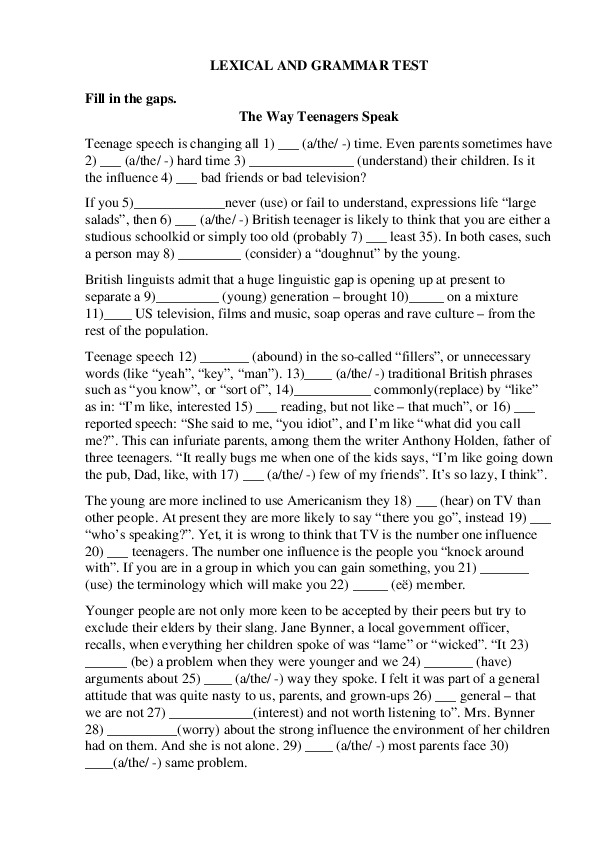Лексико-грамматический тест, для учащихся 8-10 классов. данный тест можно использовать на уроках, факультативах. Повторение по темам: артикли, времена, местоимения, предлоги. Этот тест выявит Ваши пробелы в знании правил грамматики, над которыми стоит еще поработать. При выполнении теста полагайтесь только на свои знания, не нужно прибегать к помощи справочных материалов.
LEXICAL AND GRAMMAR TEST
Fill in the gaps.
The Way Teenagers Speak
Teenage speech is changing all 1) ___ (a/the/ ) time. Even parents sometimes have
2) ___ (a/the/ ) hard time 3) _______________ (understand) their children. Is it
the influence 4) ___ bad friends or bad television?
If you 5)_____________never (use) or fail to understand, expressions life “large
salads”, then 6) ___ (a/the/ ) British teenager is likely to think that you are either a
studious schoolkid or simply too old (probably 7) ___ least 35). In both cases, such
a person may 8) _________ (consider) a “doughnut” by the young.
British linguists admit that a huge linguistic gap is opening up at present to
separate a 9)_________ (young) generation – brought 10)_____ on a mixture
11)____ US television, films and music, soap operas and rave culture – from the
rest of the population.
Teenage speech 12) _______ (abound) in the socalled “fillers”, or unnecessary
words (like “yeah”, “key”, “man”). 13)____ (a/the/ ) traditional British phrases
such as “you know”, or “sort of”, 14)___________ commonly(replace) by “like”
as in: “I’m like, interested 15) ___ reading, but not like – that much”, or 16) ___
reported speech: “She said to me, “you idiot”, and I’m like “what did you call
me?”. This can infuriate parents, among them the writer Anthony Holden, father of
three teenagers. “It really bugs me when one of the kids says, “I’m like going down
the pub, Dad, like, with 17) ___ (a/the/ ) few of my friends”. It’s so lazy, I think”.
The young are more inclined to use Americanism they 18) ___ (hear) on TV than
other people. At present they are more likely to say “there you go”, instead 19) ___
“who’s speaking?”. Yet, it is wrong to think that TV is the number one influence
20) ___ teenagers. The number one influence is the people you “knock around
with”. If you are in a group in which you can gain something, you 21) _______
(use) the terminology which will make you 22) _____ (её) member.
Younger people are not only more keen to be accepted by their peers but try to
exclude their elders by their slang. Jane Bynner, a local government officer,
recalls, when everything her children spoke of was “lame” or “wicked”. “It 23)
______ (be) a problem when they were younger and we 24) _______ (have)
arguments about 25) ____ (a/the/ ) way they spoke. I felt it was part of a general
attitude that was quite nasty to us, parents, and grownups 26) ___ general – that
we are not 27) ____________(interest) and not worth listening to”. Mrs. Bynner
28) __________(worry) about the strong influence the environment of her children
had on them. And she is not alone. 29) ____ (a/the/ ) most parents face 30)
____(a/the/ ) same problem.Keys:
1) the; 2) a; 3) understanding; 4) of; 5) have never used; 6) a; 7) at; 8) be
considered; 9) younger; 10) up; 11) of; 12) abounds; 13) The; 14) have been
commonly replaced; 15) in; 16) in; 17) a; 18) hear; 19) of; 20) on; 21) will use; 22)
its; 23) was; 24) had; 25) the; 26) in; 27) interesting ; 28) was worried; 29) ; 30)
the.


